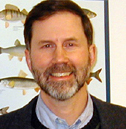
For Release: October 14, 2008
Contact: DMS Communications (603) 650-1492
Dartmouth-led Lung Disease Collaboration Renewed

Dr. Bruce Stanton
Hanover, N.H.—New Hampshire scientists have been awarded $10.5 million from the National Institutes of Health to extend a Dartmouth-led collaboration for research and training to prevent and cure cystic fibrosis, lung cancer and other respiratory illnesses.
The five-year award renews support through COBRE, the acronym for Centers of Biomedical Research Excellence, a federal program designed to strengthen research and faculty expertise in states such as New Hampshire. Building on its initial success, the program, directed by Dr. Bruce Stanton, professor of physiology at Dartmouth Medical School (DMS), will help establish a nationally recognized Center for Lung Biology and will nurture promising young investigators at Dartmouth and Keene State College.
An estimated 25 million people in this country live with chronic lung diseases including asthma, emphysema, cancer and cystic fibrosis (CF). Together they are the third leading cause of death, claiming some 360,000 Americans annually, according to Stanton. COBRE teams will work across disciplines to improve respiratory health, conducting basic science studies that will lead to better treatment and prevention.
"This COBRE renewal award to Dr. Stanton and colleagues signifies the impressive progress this group of investigators has made during the past five years through research that has provided a better understanding of various lung diseases," said Dr. William R. Green, DMS dean. "Their studies that cross departmental, different COBRE and institutional lines are prime examples of what can be accomplished by multi-disciplinary, collaborative research, both at the basic science and translational levels."
Our goal is to translate our scientific insights into novel diagnostic and therapeutic tools for patients, and to improve public health.
—Dr. Bruce Stanton
Dartmouth also has a COBRE program in immunology that was renewed in 2006. Researchers in both programs share resources and interact with similar programs at the University of Vermont, broadening biomedical excellence in both states and benefiting the health of citizens throughout the region.
"The program is grounded in state-of-the art research and embraces a bench-to-bedside approach. Our focus is on the basic biology and molecular mechanisms of lung disease. Our goal is to translate our scientific insights into novel diagnostic and therapeutic tools for patients, and to improve public health," Stanton said.
Already, he points out, several basic science research projects have led to clinical trials, including one to test a drug combination shown in the lab to prevent stubborn lung infections in cystic fibrosis, a common hereditary disorder that causes lung disease and premature death.
"Strong mentoring is a key component to develop the careers of our junior faculty. Prior funding by COBRE has led to a two-fold increase in the research support of our junior faculty, at a time when only a small fraction of faculty nationwide are successful in obtaining NIH grants." Stanton said.
He and program co-director Dr. Dean Madden, Dartmouth Medical School professor of biochemistry, will oversee the program with a cadre of senior faculty at the medical school, Dartmouth-Hitchcock Medical Center, Dartmouth's Thayer School of Engineering and Keene State College to recruit new faculty researchers, increase grant support for lung biology research and develop core facilities that will benefit all investigators at Dartmouth and Keene State College.
The newly funded projects take aim at cystic fibrosis, lung inflammation, lung cancer and the effect of biodiesel fuel on air quality and human health. Two projects center on the bacterium Pseudomonas aeruginosa, a cause of chronic lung infection in CF patients.
Dr. Deborah Hogan, assistant professor of microbiology and immunology at DMS, is looking at why the bacterium is so infectious in CF patients for clues to suppress lung infections. Dr. Karl Griswold, assistant professor of engineering at Thayer School of Engineering, Dartmouth College, is utilizing protein-engineering strategies to generate new drugs to eliminate Pseudomonas lung infections.
Dr. Scott Gerber, assistant professor of genetics at DMS, is studying lung cancer, particularly the role of Aurora A kinase in cancer. Dr. Nora Traviss, Keene State, is determining if the use of biodiesel fuel reduces the harmful emissions of diesel vehicles.
-DMS-